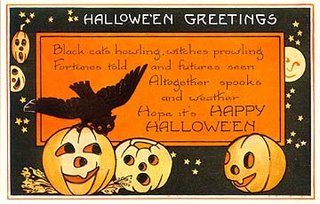
Halloween is my favorite holiday, and not out of sheer morbidity, rather because it is a holiday that dips into your imagination and craft. It is a celebration of things that are slippery, fantastical, and unseen. It is traditionally a celebration of the end of the harvest season, hence its association with death, as the fertile season comes to a close and Nature retracts her bounty. Think of Hades/Pluto stealing Persephone/Proserpine to the underworld, and Demeter/Ceres' grief and wrath, and so comes the death mask of winter. The relationship to death has its appeal, as it is one of the two most powerful events with which we have to contend. The unknown is scary, and so we jestingly face our deepest fears, and the darkest parts of human nature. It is a night of mischief, "called Pooky Night in some parts of Ireland, presumably named after the púca, a mischievous spirit." Plus, though this observation is well-worn, it is a night when nice girls are sanctioned to dress like trollopes. Beyond the obvious saucy joy in that is a genuine connection to a tradition of witchcraft and old pagan matriarchy, which venerated (from Venus) the ebullient sexuality and power of women, until the Catholic Church anathemized it. Halloween is most assuredly a holiday ripe with robust womanness, and we wouldn't have it any other way.
I've heard of a few instances of children trying to go as terribly dark characters, and being censored for political insensitivity. It is strange to me that supernatural monsters are acceptable, but real ones, like Hitler, are somehow taboo. Perhaps we have to keep a safe psychological distance from the forces we are meddling with here, and an historical monster that proves something about the darkness being real is too much to bear. Frankly, I think these kids have the whole deal worked out right. Halloween follows a primary function of the old Carnival traditions, which is to serve as a social purgative for negative energy. It delights in duality. It plays with darkness.
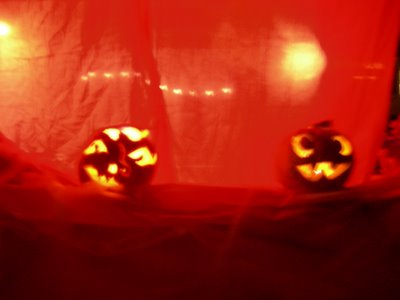
"All Souls' or All Hallows' Day (Nov. 1) was the Christian version of Samhain (end of summer), the Celtic feast of the dead, named for the Aryan Lord of Death, Samana, "the Leveller, " or the Grim Reaper, leader of ancestral ghosts. According to the pagan lunar calendar, festivals were celebrated on the "eve" rather than the day. Therefore Halloween or All Hallows' Eve was the original festival, later displaced to the following day. The Irish used to call the holy night the Vigil of Saman. Churchmen described it as a night of magic charms and divinations, reading the future with witches' mirrors and nutshell ashes, ducking for apples in tubs of water (representing soul-symbols in the Cauldron of Regeneration), and other objectionable rites. Even today it is said that a girl who peels and apple before a mirror on Halloween will see the image of her future husband in the glass. Christian authorities wrote of Halloween, "Many other superstitious ceremonies, the remains of Druidism, are observed on this holiday, which will never be eradicated while the name of Saman is permitted to remain." The name of the pagan deity remains in the Bible as Samuel, from the Semitic Sammael, the same underworld god.
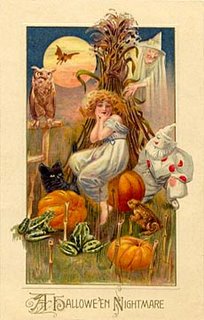
Of course the original divinations were oracular utterances by the ancestral dead, who came up from their tombs on Halloween, sometimes bringing gifts to the children of their living descendants. In Sicilian Halloween tradition, "the dead relations have become good fairies of the little ones."
 Similar customs are observed at Christmas.
Similar customs are observed at Christmas.In Lithuania, the last European country to accept Christianity, the pagans celebrated their New Year feast as Halloween, sacrificing domestic animals to their god Zimienik (Samanik; Samana). Their prayer ran, "Accept our burnt sacrifice, O Zimmienik, and kindly partake thereof." If the lord of the underworld accepted the offering on behalf of all the dead, the spirits were satisfied and would refrain from doing harm.
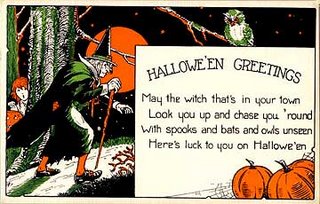 If not adequately propitiated, they might descend on the world as vengeful ghosts, led by demons and "witches" (priestesses) who summoned them. The witches and ghosts are still associated with Halloween, together with such soul-symbols as owls, bats, and cats.
If not adequately propitiated, they might descend on the world as vengeful ghosts, led by demons and "witches" (priestesses) who summoned them. The witches and ghosts are still associated with Halloween, together with such soul-symbols as owls, bats, and cats.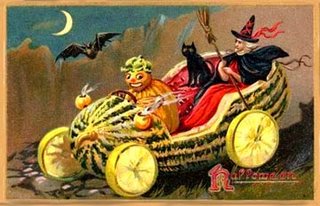
The pagan idea used to be that crucial joints between the seasons opened cracks in the fabric of space-time, allowing contact between the ghostworld and the mortal one."1
Some Words for Witches:
Incanatrix, Lamia ("night monster"), Saga, Maga, Malefica, Sortilega, Strix ("screech-owl"), Venefica ("poisoner"), strega, Janara (a priestess of Jana or Juno), hags, fairies, bacularia ("stick-rider"), fascinatrix ("one with the evil eye"), herberia ("one who gathers herbs"), pixidria ("keeper of an ointment-box"), femina sage ("wise woman"), incantator ("worker of charms"), magus ("wise man"), sortitariae mulier ("seeress"), maliarda ("evil-doer"), ansipex, auguris, divinator, januatica, ligator, mascara, phitonissa, stregula, krstaca ("crossed ones," fr. Greek, Christos), wijsseggher ("wise-sayer," which became English, "wise-acre"), Sorcier, bear-walker, beldam (fr. "belle-dame"), charmer, crone, enchantress, hellcat, magician, minx, necromancer, occultist, she-devil, siren, sorceress, warlock, faith healer, isangoma, mundunugu, obeah doctor, shaman, voodoo, wangateur, bag, battle-ax, biddy, fishwife, fury, gorgon, harpy, harridan, Jezebel, Medusa, ogress, shrew, slattern, sorceress, termagant, virago, vixen.
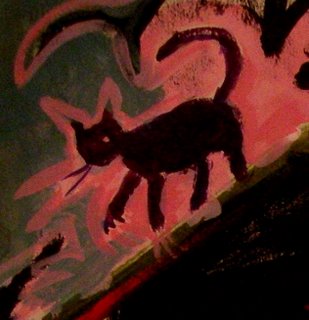
1 The Woman's Encyclopedia of Myths and Secrets, Barbara G. Walker
3 comments:
What, no references to the most Halloween of Halloween-ish events?
Dia de los Muertos?
I think I'm culturally offended here...
Okay, not really...
In a week or two I reckon I can slap together some posts for you...
Though H-Ayatch-former wasn't off on just cobbling together a collaborative blog.
I'd be down for that.
I hate Halloween!! I always have! I always will!
Huck - the idea of you being culturally offended makes me giggle.
Post a Comment